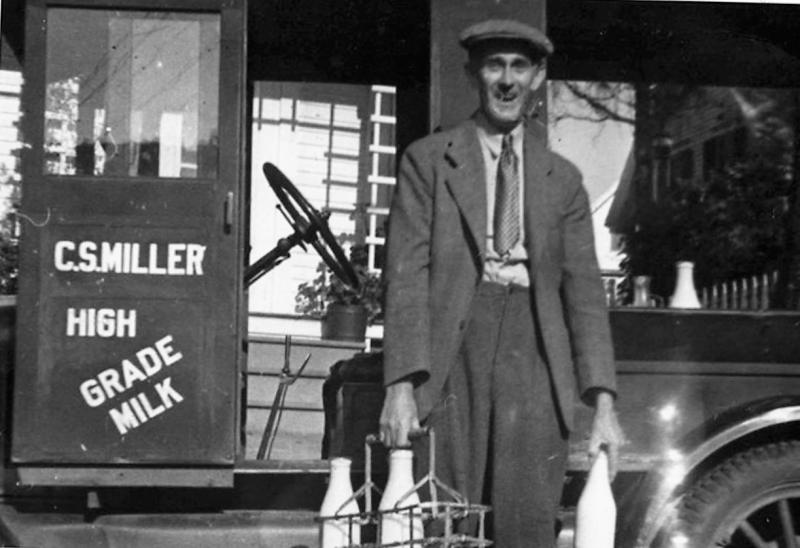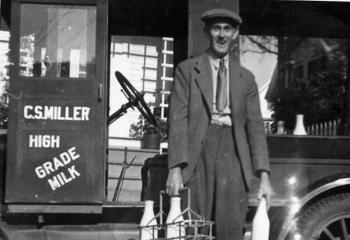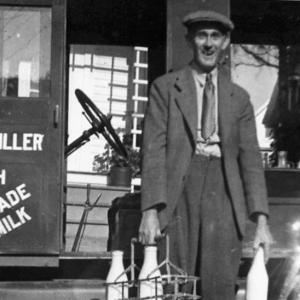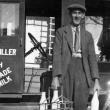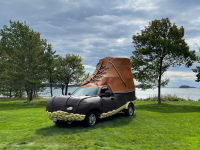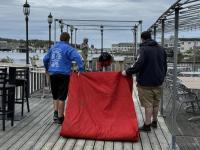Early 1900s Boothbay Harbor Milkman, Part II
Claude Miller was a milkman who lived on the east side of the intersection of Route 27 and Lakeview Road in West Harbor. He wrote this memoir in 1954 describing his years on his milk route. In 2000 Alton Swett, son of Chester Swett, gave the manuscript to the historical society. While not a skilled writer, Claude passed on details of his milkman career very well. He died in 1961. This article continues the prior one about his years as a milkman. I supplied the parenthetical remarks. – Barbara Rumsey
Milk for Squirrel
The directors of Squirrel gave me the contract to supply the cottages with milk delivered in bottles by horse and wagon on the island. Arthur Barter was superintendent; his son Kenneth took care of the horse and was down to the boat wharf with the team when the Nellie G. came to the wharf. The milk was delivered, and I and a helper were back to town at 11:30.
The island had four years of this service. Twenty seasons I sold milk to Juniper Point, also three summers to Bayville, and three summers to the art colony [on the Harbor’s east side]. One man that was at one time an agent for sewing machines, told me that he sold milk over to the art colony and a woman complained that it soured. He said "Madam, if you will put it in the ice box, not on the stove, I guarantee it will keep, but not halfway between."
Long years ago a man that was working at a hotel was chopping up ice to use in making ice cream. The milkman came in with some cans of milk. He said, “I would like to have a can of that chopped ice to put in my milk.” I have been told this milkman hired a young fellow to work in his farm, and when he was leaving for town, he gave the boy some outdoor work to do. When he got back the boy hadn't finished up, and the milkman said what you been doing all this time. The boy said I cleaned out behind the cows. The milkman said, “You can let that go until a rainy day.” Perhaps there was some truth in the stories.
Model T Truck
For quite a number of years I drove up to Boothbay with a horse and covered wagon, buying milk. I still have the picture of the covered wagon. When I started to supply the cottagers at Squirrel Island with milk, I bought a 1909 Model T truck with an Atwater Kent system. It even had the brass rods to hold up the windshield. I didn't even know how to start the engine, so it was left in the yard. I got a man to show me how to start it and I used to drive out to the road, and then back it up as far as the barn. The first three trips I made up in Boothbay I got a man to go with me and teach me how to drive it. He had driven a Model T for a number of years, and he was very careful to show me where to carry the spark to get the most power going up hills. I drove for quite a while and carried the spark on hills the way he told me. Then one day a man told me that with an Atwater Kent system, the spark wasn't hooked up and it didn't make any difference.
One day a man by the name of Jessie was doing some work on the truck, and when he got ready to crank her he told the boy not to touch the spark, and when he cranked her she kicked back and he started to have a scrap with the boy, and I told him the spark wasn't hooked up on an Atwater Kent system. The same year in the latter part of June I was going up in town after milk and when I got near the Charlie Reed place [on the Meadow], two women in a truck were slowing down and wanted to speak, and I said, “Look and see if there is a car coming.” He said, “Look out!” It was too late—the Ingraham brothers from Augusta and Squirrel Island struck the rear end of my truck on the side that I was on. It shot two lengths over into Charlie Reed's field, broke the cross bars on the side I was on, broke two of the uprights that held the top up, hurt the boy’s back, and injured my leg so that I was lame two months.
I bought a half-ton truck of Captain Eben Lewis. The insurance company gave me what was left of the first truck and paid for the one I bought and gave me one hundred dollars for injury to my leg. I have tried to shorten up the story of some of my experiences and haven't been able to do it, although I have left out a lot.
Event Date
Address
United States

